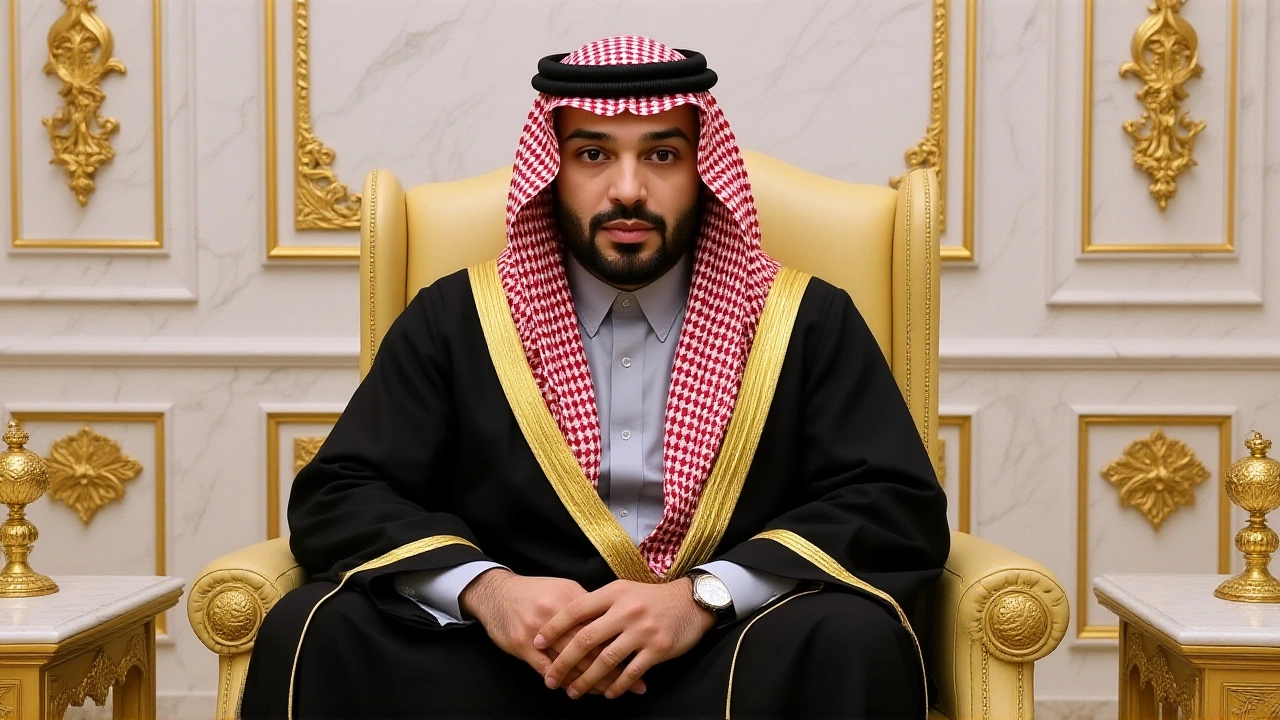Trump Defends Saudi Crown Prince Amid $12.7B Deal, Ignoring Khashoggi Killing
 Nov, 21 2025
Nov, 21 2025
When President Donald Trump sat beside Crown Prince Mohammed bin Salman in the Oval Office on November 18, 2025, and declared, "the crown prince knew nothing about the killing of Khashoggi," he didn’t just contradict U.S. intelligence—he erased a decade of diplomatic posturing on human rights. The moment, captured by White House cameras and broadcast live, came just hours before the Saudi leader began a high-stakes lobbying tour of Capitol Hill. It wasn’t a slip of the tongue. It was policy, delivered with a smile.
A Reversal Written in Blood
The the killing of Jamal Ahmad Khashoggithe Saudi consulate in Istanbul wasn’t just a crime. It was a turning point. A 59-year-old journalist, married with no children, who wrote for The Washington Post and had become a quiet symbol of dissent, was lured into the consulate on October 2, 2018, and dismembered by a 15-man Saudi hit squad led by Maher Abdulaziz Mutreb. The CIA’s 2021 report, declassified under President Biden, left no ambiguity: Crown Prince Mohammed bin Salman personally ordered the operation. Yet here, seven years later, Trump dismissed it as "a misunderstanding."It wasn’t the first time. In April 2019, the Trump administration lifted Magnitsky Act sanctions on 17 Saudi officials tied to the killing. Arms sales? Never stopped. $8.1 billion a year. Now, with a $12.7 billion package sealed at the Saudi-U.S. Investment Forumthe Ronald Reagan Building, the message was clear: money talks louder than murder.
The Deals That Drowned Out the Truth
The numbers told the real story. A $4.2 billion contract for Lockheed Martin to supply THAAD missile defense systems. A $3.8 billion investment from Saudi Aramco into Texas shale projects. Another $4.7 billion across AI infrastructure, fintech, and defense R&D. The total was 22% higher than the $10.4 billion signed during the crown prince’s last visit in March 2018. And the White House didn’t just celebrate—it cheered. "This is the future," Trump said, gesturing to the Saudi delegation. "Strong nations do business. Weak ones debate.But behind the handshake photos and press releases, the human cost mounted. As of November 15, 2025, Amnesty International documented 1,247 political prisoners in Saudi custody—women’s rights activists, clerics, bloggers. Loujain al-Hathloul, who fought to lift the driving ban, remains imprisoned. The same crown prince who opened cinemas and allowed concerts in 2018 also jailed over 298 women activists between 2018 and 2019. Reform, it turns out, doesn’t mean freedom.

Who Lost Their Voice?
The most chilling moment came on November 19, during the investment forum. ABC News correspondent Barbara Pinto, 32, asked the crown prince: "How do you reconcile your vision for modernization with the ongoing imprisonment of women who dared to speak?" Before she could finish, Trump cut in: "You’re a terrible reporter." Security guards moved in. Pinto was escorted out. No apology. No follow-up. Just silence.That silence echoed in McLean, Virginia, where Hanan El-Atr, Khashoggi’s widow, sat watching the broadcast. "I’m upset," she told a local reporter. "And I’m in shock. Not because he said it—but because so many in Congress are nodding along. We thought the world remembered him. Now I wonder if anyone does."
A Global Signal to Autocrats
"Trump has ignored some of the most fundamental principles underpinning US relations with the world," said Brett Bruen, former Obama NSC director and now head of Global Situation Room. "His words and actions give a green light to strongmen to do whatever they want."That’s exactly what John Sifton, Asia Advocacy Director for Human Rights Watch, feared. "The United States government no longer has any credibility on human rights issues, at home or abroad," he said. "When the world’s most powerful democracy shrugs off the dismemberment of a journalist, why should anyone believe its promises?"
It’s not just moral. It’s strategic. Countries like Russia, China, and Egypt have quietly taken note. In Beijing, state media ran a headline: "The West’s Double Standard Is Dead." In Moscow, officials quietly increased support for Saudi oil diplomacy. The message was received.

What Comes Next?
The Senate Foreign Relations Committee, led by Ben Cardin, will hold hearings on December 3, 2025, to review U.S.-Saudi arms sales. But with Republicans controlling the chamber and defense contractors lobbying hard, little change is expected. Meanwhile, the seventh anniversary of Khashoggi’s murder—October 2, 2026—looms. Activists are already planning global vigils. Will the White House attend? Or will it send another press release praising "strategic partnership"?There’s a deeper question, too. If the U.S. abandons human rights as a pillar of foreign policy, what replaces it? Economic interest? Military leverage? Or just the quiet calculation that autocrats are easier to do business with than democrats?
Frequently Asked Questions
Why did Trump ignore the CIA’s findings on Khashoggi’s murder?
Trump’s reversal wasn’t based on new evidence—it was strategic. The U.S. relies on Saudi Arabia for oil stability, military basing rights, and counterterrorism cooperation. With the 2026 election looming, Trump prioritized corporate donors and defense contractors over human rights accountability. His administration has consistently downplayed Saudi abuses since 2017, even as the CIA and UN repeatedly confirmed the crown prince’s direct role.
How does this affect U.S. credibility with allies?
Allies from Canada to Germany have privately expressed alarm. The EU has delayed a planned arms export review to Saudi Arabia, citing "ethical concerns." NATO partners now question whether U.S. commitments on democracy promotion are real—or just rhetorical. The shift undermines decades of soft power built on moral leadership, making it harder to rally coalitions on Ukraine, Taiwan, or Iran.
What’s the financial impact of the $12.7 billion deal?
The $12.7 billion in deals includes $4.2 billion for Lockheed Martin’s THAAD systems, $3.8 billion for Aramco’s Texas shale investments, and $4.7 billion in tech and AI partnerships. These contracts will create an estimated 18,000 U.S. jobs, mostly in Texas, Florida, and Maryland. But critics argue the economic benefit is offset by long-term reputational damage and the risk of enabling further repression.
Is there any legal recourse for Khashoggi’s family?
The family has pursued civil cases in U.S. courts under the Alien Tort Statute, but U.S. courts have consistently dismissed them on grounds of sovereign immunity. The Biden administration blocked a 2021 lawsuit against Saudi officials. With Trump’s renewed embrace of the crown prince, legal avenues are now effectively closed unless Congress passes new legislation—something unlikely given current partisan divides.
What’s the connection between Vision 2030 and this diplomatic push?
Vision 2030, launched in 2016, aims to reduce Saudi reliance on oil by 2030. To attract foreign investment, the crown prince needs U.S. tech, defense, and energy partnerships. The $12.7 billion deal is the centerpiece of that strategy. But while the kingdom touts reforms like women driving, it continues to imprison dissenters. The U.S. is now complicit in legitimizing that contradiction.
What will happen on October 2, 2026?
The seventh anniversary of Khashoggi’s murder will likely trigger global protests, digital campaigns, and renewed congressional pressure. Activists plan coordinated actions in Washington, London, and Riyadh. But with Trump likely back in office, the White House may issue a statement praising "progress in bilateral relations"—and ignore the anniversary entirely. The world will be watching to see if the U.S. still believes in anything beyond its bottom line.